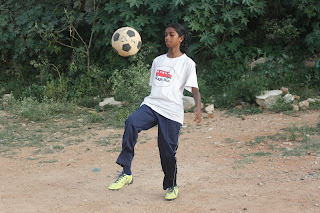Five years ago, Bhagyalakshmi suffered a bout of depression. Her newborn infant suddenly went into a coma and finally died three years later.
When the lines of reality started blurring for Bhagyalakshmi, her dear ones decided to send her to work, thinking it would do her some good.
Her search for a job landed her in an NGO called Magic Bus in Bengaluru, which uses an activity- based approach to bring children out of poverty.
It not only revived Bhagyalakshmi's spirits but she became aware of her long lost love for football.
But with a household to run with two children, a girl and a boy, she decided to enrol her daughter in the NGO.
Her efforts paid off as her little girl, Lydia, is all set to go to the United Sates for the second time to attend a football coaching camp for 15 days conducted by July Foudy Leadership Foundation.
She was picked up just because of her sheer talent. Last year, there were three girls from Bengaluru. This time, she is the sole participant.
I arrived at her place at Doddanagar a little late in the evening. Lydia, a tall 15-year-old girl was already waiting for me.
Since her place was a bit congested, she took me to a small hill nearby, on top of which is a Murugan temple.
A few feet underneath, a lot of little boys were playing football. The moment they saw us on the hill, they stopped playing and came running towards us.
There would be 10-12 children. "They are my best friends," says Lydia. Surrounded by a lot of surprised eyes, we started our tete-a-tete.
Lydia says she never thought she could play football.
She credits her love for the game to Kavitha, her Magic bus mentor, who introduced football to girls in their community, which was a privilege only accorded to boys until then.
Soon, she became one among the girls who played football in her community. Within a short span of time, she got opportunities to represent the organisation against many big teams.
"At the outset, our team lost in a match against Mysore team. We were new. But soon we acquired the skills and we started beating many other teams," Lydia says. Narrating her experience in America, she says, "When I went there last time, they talked about leadership qualities. How it changes lives. When I came back, I tried my best to inculcate the leadership qualities which I have learnt from there." Even before her trip to the US that quality might have been inherent in her, otherwise, she would not have gone door to door in her community asking parents to allow their girl children play football as parents did not want them to wear shorts while playing.
"Some became ready to send their daughters and some remained unconvinced," Lydia says. The girl is hardly lured by the pomp and splendour she experienced in the US. Her focus is clear as a crystal. "It's my dream to be a football coach and I want to go to rural areas and teach children football," Lydia points out. One of the inspirational experiences she had was when she watching a video based on the life of July Foudy, an Olympic gold medalist and retired American football player. "It was touching to see the hardships she had to endure before she made it big.
It instilled in me a lot of courage to seek what I really want," Lydia says. Though she is in awe of America, she says she prefers India. "There, everything looks the same - people, the places. But here, everything is different and I feel it is special. Most of the time, they eat green vegetables. It's good for health we are not used to it, right," she asks. But she is quick to add that she liked pizza. Lydia has already done her homework.
One of them being concerns updates of a project which she had taken up during her coaching days. "We are asked to pick a community project. I chose a project of planting 10 trees. I have planted 15 tree saplings in my place and they are certainly going to ask me how my project is progressing," Lydia says. Lydia's best supporter has always been her mother. Though her father initially was wary of her playing football, it changed when she got selected to the Barcelona camp in Bengaluru. Lydia will leave for the US on July 7.
Natasha Ramarathnam, Magic Bus Regional Director, South, says, "Our children and youth complete their education and get sustainable and meaningful livelihoods, while successfully fending off destabilizers like child labour and child marriage. Lydia is perfect example of the impact that Magic Bus has on the children in its programme. A young girl from the community is now going to the US to represent Magic Bus India in a global programme devoted to developing young leaders. Far from being nervous about the responsibility, the only things she is concerned about is how she will make up for the classes that she will miss when she is abroad."
- Shalet Jimmy
Originally published here Bend it like Lydia: B'luru girl kicks her way to US



